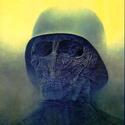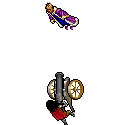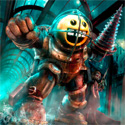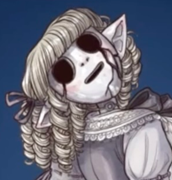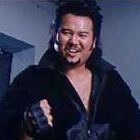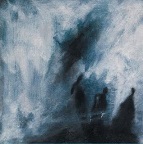|
Its been two years since I took a class on this stuff so I don't remember names. Just scrounge up some critiques of GGaS. Or start a topic.
|
|
|
|

|
| # ? Jun 5, 2024 09:26 |
|
A human heart posted:Can you cite some of these anthropologists that you're talking about? Stop it. Stop. It.
|
|
|
|
so I've recently finished some recently translated (to english) stuff. Jan van Mersbergen - Tomorrow Pamplona comes dangerously close to Hemingwey fanfic at times with a silent boxer who's running from an initially unnamed Bad Thing and hitches a ride with a 9-5 suit kind of guy who's going to Pamplona bull race like he does every year. The book is about finding out their respective mysteries with the fight-or-flight theme tying it all together nicely. Well written and structured novel, but not really my kind of thing, so it left me a bit cold. Tomás González - In the Beginning was the Sea. Much more my kind of thing: an intellectual anti-intellectual couple goes to start a new life on a farm of their own in some bumfuck Colombian island, where it all goes predictably wrong with their city lifestyle banging up against the rural reality of the place just like ith as happened to everybody else on the island. Like Maqroll-lite with more focus on the world rather than the character. Still, something bothered me about the book, not letting me enjoy it fully, maybe because it seemed quite similar to Tomorrow Pamplona in its spase language and moody indie cinema aesthetic. Yuri Herrera - Signs Preceding the End of the World I read on trains and platforms, which is probably the worst possibly way how to read an intense 120 pp book. It borrows a lot from comics in the overall style and the characters, but the plot is something right out of Cormac McCarthy or something. If more goons read it, the book would be mentioned constantly on the forums, so I'm happy it hasn't happened yet. I'll def re-read it though, when I'm sure I'll get two or three uninterrupted hours. Han Kang - The Vegetarian was the cream of the crop - a slightly surreal story about giving in to the temptation to cut the tether that holds y out to life, not necessarily by suicide but simply by stepping away from scial obligations. The tone was perfect for me: almost clinical in its description of weird thougths and events that come with the story + tight metaphors that really bring out the reality & craziness of the whole thing. At times it reads almost like psychological horror as done by a literary writer.
|
|
|
|
Burning Rain posted:Yuri Herrera - Signs Preceding the End of the World I read on trains and platforms, which is probably the worst possibly way how to read an intense 120 pp book. It borrows a lot from comics in the overall style and the characters, but the plot is something right out of Cormac McCarthy or something. If more goons read it, the book would be mentioned constantly on the forums, so I'm happy it hasn't happened yet. I'll def re-read it though, when I'm sure I'll get two or three uninterrupted hours. I didn't really get much of a McCarthy vibe from this other than the fact its about border culture
|
|
|
|
I haven't actually read mccarthy (at least for 5 years), I just wanted to say it, because that's what people do.
|
|
|
|
Wool - Hugh Howey Only the first book so far, but I have the whole omnibus. Was disappointed after reading the first half of the book. Writing is reasonable but not great and it definitely suffers from starting with mostly self-contained stories and characters. It definitely picks up in the last third of the book where there is more continuity with the events and the characters. I finished this book and started immediately reading Oryx and Crake by Margaret Atwood. I don't really have a strong opinion about it yet, but it's was very striking how much better the narration seems compared to Hugh Howey.
|
|
|
|
Pocket Billiards posted:Wool - Hugh Howey Wool is good in a fun way. Oryx & Crake is one of my favorite novels; I met Margaret Atwood shortly after reading it, and she - and the book - made a profound impression on me. I've never read the other books in the trilogy, though have heard good things. She is a brilliant literary treasure and I encourage anyone to read her works.
|
|
|
|
Dune by Frank Herbert. Duney duney dune. Found the characters a bit lacking. A pleasing adventure story overall. Probably won't read the sequels anytime soon.
|
|
|
|
The Devil in the White City by Erik Larson. It was absolutely excellent and I highly recommend it: engaging, interesting parallel history of HH Holmes, a serial killer, and the 1893 Chicago Worlds Fair. (I wish it had more serial killer though).
|
|
|
|
The Grace of Kings by Ken Liu Its A Song of Ice and Fire with Chinese characteristics! I've been looking for another good door stopper fantasy full of political intrigue and this one fit the bill. There are lots of excellent POV characters and plot twists that manage to actually be surprising. I was most impressed by how dense the plot was. Liu managed to cram a story arc that easily could have gone into 3 or 4 books into one beefy tome. Unfortunately, being super Chinese means that victory usually goes to whoever quotes the best proverbs.
|
|
|
|
The March North by Graydon Saunders, and currently reading the sequel. Another poster said that it's a bit like reading a science textbook starting halfway through, and I have got to agree. A lot of concepts are referenced as though they'd already been covered previously, like of course we all know what an eel-tree is and what a Line battalion can do with its standard, so let's move on. They're also discussed in oblique references and sentence fragments, more like aide-memoires than proper exposition. Either of these would be quite tolerable, but the combination is a bit dizzying, feels like I'm in some sort of fever dream.
|
|
|
|
Solitair posted:Titus Alone by Mervyn Peake. I'd maybe describe the entire series as a noble failure, albeit for different reasons in the first two books as in the last one. Knowing Peake's plans, the stylistic shifts may have been fully intentional, but they never culminated in anything due to his illness and death. Hope you can gather your thoughts on all of it eventually.
|
|
|
|
darthbob88 posted:The March North by Graydon Saunders, and currently reading the sequel. Another poster said that it's a bit like reading a science textbook starting halfway through, and I have got to agree. A lot of concepts are referenced as though they'd already been covered previously, like of course we all know what an eel-tree is and what a Line battalion can do with its standard, so let's move on. They're also discussed in oblique references and sentence fragments, more like aide-memoires than proper exposition. Either of these would be quite tolerable, but the combination is a bit dizzying, feels like I'm in some sort of fever dream. quote:Back in the day, Graydon was notorious for a compressed and idiosyncratic style of writing that did for online communication what a squirt of crazy glue up the nostrils does for free and easy breathing. This novel is by no means as opaque and enigmatic as Graydon could be on rasf-l and its successors (due, I am given to understand, in great part to his talented editor, Marna Nightingale [4])—but at the same time he’s not interested in the sort of narrative handholding you might see in works by, oh, Brandon Sanderson or Tony Daniel. Great series IMO, although I found books 2 and 3 a bit too similar for my tastes (hoping for book 4 to kickstart the action).
|
|
|
|
Nakar posted:I'd be interested to hear your take on it in full, at least. I found the first two books insufferable and the third moved faster but seemed like an entirely different series. Titus's characterization is particularly perplexing, but I'm not sure I ever had a firm handle on his personality in the first place beyond "doesn't like his position and the traditions of Gormenghast." The absence of Dr. Prunesquallor and Bellgrove, the only characters that felt consistently-realized -- and well, Flay, and I suppose an argument could be made that those characters are non-flat while others are for a reason -- probably didn't help. Muzzlehatch couldn't measure up. That said, I can't hold up any of the books as somehow vastly superior to the others and I have some idea of what Peake was intending and just couldn't pull off. This is an index of every blog post I wrote about the series. The evaluation I mentioned is in the last link. In the other posts I describe how much I actually like Fuchsia, with her arc in the first book and how she and Titus supported each other in the second. I also found Steerpike to be an effective villain, if not a complex one. He's certainly more entertaining than Cheeta in Alone, who I absolutely hated to read about pretty much from the first pages she appears in. I get why you hate the series. It's not for everyone, since it has the purplest prose I've ever seen in the book. But that prose, along with the exaggerated nature of the characters and the setting, made me feel like I was in an alien world even though these were human beings in a completely nonmagical castle, and I liked feeling that way. By the time that wore off, all of the set-up for Steerpike's game had happened, I familiarized myself with everyone involved, and I really wanted to see how that turned out. You say that Titus Alone moved faster than the other books, but without the ensemble of Gormenghast and Steerpike's machinations driving everything along (except for the feud between Flay and Swelter, which culminated in one of my new favorite fight scenes from books), it feels like things are happening for almost no reason. The book also moves faster because the new settings (at least three of them!) feel disconnected and just aren't as fleshed out as Castle Gormenghast, and also because there are fewer key characters and more bit ones that don't matter. This is what I mean when I say that almost every change in Titus Alone works worse than how the first two books worked instead. The only change that I really like is the shift to science fiction, which makes sense given that we are now being introduced to the opposite extreme from Gormenghast (and because both places are at such extremes I kind of believe that they wouldn't know of each other's existence). Again, the problem is that this is not explored to the extent that Gormenghast's absurd rituals are. It's neglected in favor of bringing up Titus's doubt in his past for the umpteenth time while barely advancing that doubt. I could go on, but I already did on my blog.
|
|
|
|
The Millionaire Next Door - I'll save you the trouble of reading it. Be frugal, budget, own your own business, save your money, don't give your kids anything until they've made it on their own, and only drive American-made, Detroit steel. That will make you a millionaire.
|
|
|
|
Solitair posted:This is an index of every blog post I wrote about the series. The evaluation I mentioned is in the last link. In the other posts I describe how much I actually like Fuchsia, with her arc in the first book and how she and Titus supported each other in the second. I also found Steerpike to be an effective villain, if not a complex one. He's certainly more entertaining than Cheeta in Alone, who I absolutely hated to read about pretty much from the first pages she appears in.
Which brings me to Titus. Solitair posted:You say that Titus Alone moved faster than the other books, but without the ensemble of Gormenghast and Steerpike's machinations driving everything along (except for the feud between Flay and Swelter, which culminated in one of my new favorite fight scenes from books), it feels like things are happening for almost no reason. The book also moves faster because the new settings (at least three of them!) feel disconnected and just aren't as fleshed out as Castle Gormenghast, and also because there are fewer key characters and more bit ones that don't matter. His doubt about his past drives at what I believe was one of the major themes Peake intended to explain as the series went on, and his death cuts things short. We're looking at Titus in the middle of his character arc, if not earlier. Gormenghast is an intentionally absurd over-reliance on past identity and ritual to the point that nothing in it has any meaning. It's clear from the descriptions of the rituals that they were established to have some kind of meaning in their time, but have become drudgery or spectacle without allowance for change. The Master of Rituals is supposed to be exacting down to the dates and times, so there's no opportunity for new generations to find their own meaning in the traditions as they're allowed to evolve, represented by the Bright Carvers' works of individual artistic expression being burned or locked away in a gallery nobody ever visits. The city is change and progress and science without respect for where anything came from or the value of preservation, represented by the scientists killing Muzzlehatch's zoo animals to basically no meaningful end. These two extremes are both alienating to Titus, as they should be, because rejecting one and indulging the other gives no foundation to be a fully-realized person. At the end of the novel Titus returns to Gormenghast, which confirms for him that his past was real. However, he chooses to turn away from it and leave, not just for a time but forever: "There he stood: Titus Groan, and he turned upon his heel so that the great boulder was never seen by him ever again. Nor was the cave: nor was the castle that lay beyond, for Titus, as though shaking off his past from his shoulders like a heavy cape began to run down the far side of the mountain, not by the track by which he had ascended, but by another that he had never known before." He is repudiating Gertrude's claim that he will have to return, but at this point he has also repudiated the city and the people in it, which is important, as otherwise it reads like he's rejecting what Gormenghast is. I think Peake's point here is that what Titus needed out of finding Gormenghast again was confirmation in the face of the chaos of change that he is someone ("There he stood: Titus Groan"), that he came from somewhere, and that somewhere has shaped him but no longer exists to shape him. Aware of where he came from, he can't be a member of a society that doesn't know itself (the city inhabitants are always strangely dismissive of the notion that Gormenghast even could exist, they can't imagine that institutions could be that strong), and so he has to choose neither, and wanders off again looking to become someone. And then he never gets to the part where he becomes someone, because Peake died. In departing, he also forces a sort of mature change to Gormenghast itself: Not the forceful and directed changes of Steerpike, but the inevitable confrontation of the alteration of social order by the removal of the Groan line. Which we will also never know, but have reason to think Peake intended to get to, as Gormenghast Revisited was one of his intended titles and if we take the narration of Titus Alone at its word then Titus isn't the one going back there. But that said I think all three books are flawed in a constructive sense, and yet I can respect them all (including Titus Alone) for the exploration of modernity that I think Peake was wobbling his way toward by a study in fantastical extremes. But his message is incomplete, and always will be, which is also kind of interesting in itself. I just wish he'd found a way to say more in the thousands of pages he had laid out already.
|
|
|
|
I just finished four great books by an author that is new to me. Days of High Adventure by Elliot Kay This one is a DnD campaign gone wild. It's humorous but managed to avoid the "I turned my last campaign into a book" problem. It's definitely aimed at adults with some sex, drug use and good old-fashioned ultra violence. It may or may not be satanic. The Poor Man's Fight trilogy by Elliot Kay (Poor Man's War, Rich Man's Fight and Dead Man's Debt) This series got my interested by setting up the premise of a dystopian future interstellar civilization where the vast majority of citizens are in debt for their mandatory education. He uses this hook to add some depth to his world but avoids turning into a crappy Ayn Rand word vomit mass of half-baked ideas and poor prose. It's a great scifi series with a lot of action and a bit of philosophy. Plus, it's a military war story with a focus on the navy. It also manages to wrap itself up at the end of the third book.
|
|
|
|
Pocket Billiards posted:Wool - Hugh Howey I read Beacon 23 by Howey and while it was a little weird, it was actually fairly decent. Didn't feel like it became a chore to read during any parts of it. Haven't read Wool yet but that's on the eventual list.
|
|
|
|
Echopraxia by goon favorite Peter Watts, the sequel to Blindsight and hopefully book 2 of the firefall series trilogy or whatever! It took a long time for this book to get its hooks into me, but I'm glad it eventually did, I really enjoyed the adventure, and the coda at the end was very mind bending and fun, though not as much as Blindsight. I kinda hope Jim Moore gets his own prequel/spinoff series, he could be like Big Boss of Metal Gear 2099.
|
|
|
|
|
Loving Life Partner posted:Echopraxia by goon favorite Peter Watts, the sequel to Blindsight and hopefully book 2 of the firefall series trilogy or whatever! Echopraxia felt like much more of an action movie waiting to happen than Blindsight did, and it occurs to me as I write that sentence that Watts wrote Echopraxia after he wrote the novelization of Crysis 2, and now I can't help but suspect those two facts are related.
|
|
|
|
Deadpool, Vol. 1: Dead Presidents - at the recommendation of my local comic book shop owner, I picked this up. What a great story arc. Great writing and great art all around. If you've been curious about Deadpool comics after seeing the movie, this is certainly a great place to start. (If graphic novels aren't considered applicable to this thread, I won't post them in the future.)
|
|
|
|
I picked up a bunch of audiobooks in the recent audible sale, and the first one I grabbed, Please Don't Tell My Parents I'm a Supervillain is pretty amazing. I liked it so much that at about the halfway point, I went on Kindle and purchased the other two books in the trilogy. Here's a quick Summary:  The story is about 13-year-old Penelope Akk, the daughter of Brian "Brainy Akk" Akk and Beatrice "The Audit" Benevolent Akk. She wants her superpowers, and she wants them now. When an attempt to build a device to create superpowers goes awry, she accidentally develops superpowers anyway. Her parents believe it's a one-off flash, but she quickly learns her limits and starts building stuff. When she runs afoul of a local heroic sidekick, she and her best friends, Claire Lutra, and Ray Viles form the supervillain team "The Inscrutable Machine." The problem? They want to be heroes! Follow Bad Penny, E-Claire and Reviled as they try to navigate the supervillain-superhero dynamic, and try to get the Super-community to take them seriously. The books are $5 on the Kindle store, and like $20 on Audible without the sale. HA! AH HA HA HA HA HA HA! Senerio fucked around with this message at 13:58 on Apr 20, 2016 |
|
|
|
Source your quotes
|
|
|
|
|
I just finished motherfucking The Color Purple. I mean, drat, son. I don't really know what to say about it, other than that I consistently found it far more uplifting than sad, which is a staggering achievement for a book that has incest rape on the first page. The main characters are so strong in the face of adversity, and so determined to experience love and connection in their lives. Good stuff. Thinking about picking up Meridian from the library soon to continue my Alice Walker education.
|
|
|
|
High-Rise, by JG Ballard. This took a while to grow on me, as it'd been a while since the last time I read anything by him, but once I was on board I barely put it down. Ballard has this amazing sense of momentum, of things getting drawn inexorably forward - or backward, as is often the case. This is a book about a fancy block of flats and the affluent tenants who slowly but surely succumb to the psychological turmoil of isolation and manufactured society. It's grim, it's fun, and it's immensely satisfying, and I'm so glad I finally read this, especially before seeing the film adaption that's come out. Also it made me seriously wonder how dog actually tastes. I Love Dick, by Chris Kraus.This is a tricky book to read. A fictional tale about Kraus lusting after and possibly having a love affair with the titular Dick, it blends reality and fantasy so much that it's difficult to see the seams, if indeed there are any. The first half of the book explores her relationship with Dick, and with her husband Sylvere, who is involved in her infatuation from the start, ending up in a strange and uncertain "love triangle". But it's more complex than that: the rest of the book is Kraus analysing herself, her relationship with art, feminism, activism, Jewishness. It's an engaging self-reflexive style that she calls 'Lonely Girl Phenomenology', which I think is a great term. Despite the first half being a little shaky, it really picked up for me toward the end, and I learned a lot more than I was expecting about art, postmodern theory, and even Guatemalan politics. And the ending was pretty perfect. Ghost House, by Hannah Faith Notess. A short collection of poetry, about nostalgia, longing, videogames and hope. It made me feel a lot of things, and I'm grateful.
|
|
|
|
The Traitor Baru Cormorant by Seth Dickinson. I never thought I'd enjoy a hard fantasy economic thriller, but here we are.
|
|
|
|
I simultaneously finished The Urth of the New Sun by Gene Wolfe and Fire by Fire by Charles E. Stross. I expected Stross's book to be pulp action, and in spurts it was, but the main character is an investigator and a speaker far more often, especially in the last act when the plot turns into Master of Orion. As for Wolfe's book, reading it along with something else was a mistake (and maybe waiting so long to read it after I first finished Book of the New Sun). I'm gonna read it again later, because I understood maybe half of it, but I want to know more because I still love the tone and atmosphere.
|
|
|
|
Just finished Forge of Darkness (The Kharkanas Trilogy) by Steven Erikson. This book is the epitome of wordy and heavy handed. It is oppressively philosophical to the point of being outright comical. A 670 page stream of conscience introspective tirade. The best thing I can say about this book is that it instilled pride in me for having finished it.
|
|
|
|
Poldarn posted:The Traitor Baru Cormorant by Seth Dickinson. I never thought I'd enjoy a hard fantasy economic thriller, but here we are. Sup
|
|
|
|
Poldarn posted:The Traitor Baru Cormorant by Seth Dickinson. I never thought I'd enjoy a hard fantasy economic thriller, but here we are. Just finished it as well. After all the great goon press, I had to check it out. I'll admit, not something I would have read without the talk (just because I rarelyread fantasy these days) but really gripping. Going to have to pimp it out to people I know. Also, Battuta - you're an evil, evil bastard. Do keep it up.
|
|
|
|
Pig Tales, by Marie Darieussecq. This was a really pleasant surprise! What looks on the surface like trashy transformation erotica (it's about a woman who turns into a pig) is a surprisingly deep, funny and interesting story. Written in the mid-90s, it's told from the point of view of a masseuse-turned-sex-worker as she changes, along with Paris around her. Societal collapse, political strife, cannibalism, and a millennial cult all feature at one point or another, as well as the grisly body-horror of the protagonist's transformation. Worth checking out!
|
|
|
|
Purity by Johnathan Franzen. Hmmmm. Disappointing. While I think Franzen is a technically good writer and his insanely dysfunctional characters are imaginative and believable, he spends the majority of this book fleshing out his character's back stories which he proceeds to do almost nothing with. None of his characters are particularly sympathetic and I found myself struggling to care what [little] had happened to them. Franzen also continually seems to want to make some sort of commentary about the internet and social media throughout the book but what exactly he was trying to say I wasnt sure, and it didn't seem like he was too sure either.
|
|
|
|
Just finished Robert Harris' long-awaited conclusion to his Cicero trilogy, Dictator. It's quite good, although it deals with the part of the story that we all know way too much about already, ie: Caesar vs. Pompey, Caesar as dictator, the Second Triumvirate, etc etc. But it's cool to get a (fictionalized but still mostly accurate) account of what it was like from a perspective other than the victors'. I've always felt that Harris does a good job of portraying Cicero fairly, and this one is no different. The guy was a blowhard and an egoist, but ultimately someone who was pretty virtuous and wanted desperately to save the Republic.
|
|
|
|
Oh hey I just realized who you are :p I've been reading your short stories online too, I like 'em.
|
|
|
|
The Midas Flesh, vol. 1 & 2, by Ryan North, Branden Lamb, Shelli Paroline, Steve Wands. A rad and colourful SF comic about a trio of scavengers whose spaceship finds a desolate Earth transformed completely into gold by the legendary King Midas. However, they're not the only ones after the king's remains, and they come up against the forces of an oppressive Galactic Federation. It's fun pulpy science fiction with a neat premise, and Ryan North is a pretty good writer! The second half of the story is bigger, more risky, and comes close to feeling a little rushed. But the final encounter, and the ending itself, are very satisfying. Good stuff. Slow Bullets, by Alastair Reynolds. The latest work by my favourite SF author. It's a "novella", though in this case it just means "200 pages instead of Reynolds's usual 500+". It's still a good, full story, with a starker and more desolate setting than I had expected from the opening scene. It's claustrophobic, and has the feel of a classic high-concept science fiction story, centred around the problem of how to go about rebuilding a civilisation. It's not my favourite of his, but less-good Alastair Reynolds is still better than a lot of things.
|
|
|
|
Timothy Wilton's The Pre-Raphaelites. Good introduction to the movement, but obviously suffers from being such a short book on such a large topic.
|
|
|
|
Gertrude Perkins posted:Slow Bullets, by Alastair Reynolds. The latest work by my favourite SF author. It's a "novella", though in this case it just means "200 pages instead of Reynolds's usual 500+". It's still a good, full story, with a starker and more desolate setting than I had expected from the opening scene. It's claustrophobic, and has the feel of a classic high-concept science fiction story, centred around the problem of how to go about rebuilding a civilisation. It's not my favourite of his, but less-good Alastair Reynolds is still better than a lot of things. Is it part of his Revelation Space universe, and would it make a good introduction to Reynolds' work as a whole? I might end up reading it as part of my Hugo Awards coverage, assuming Reynolds doesn't get it removed from the ballot this year.
|
|
|
|
Solitair posted:Is it part of his Revelation Space universe, and would it make a good introduction to Reynolds' work as a whole? I might end up reading it as part of my Hugo Awards coverage, assuming Reynolds doesn't get it removed from the ballot this year. Slow Bullets is a standalone.
|
|
|
|
Solitair posted:Is it part of his Revelation Space universe, and would it make a good introduction to Reynolds' work as a whole? I might end up reading it as part of my Hugo Awards coverage, assuming Reynolds doesn't get it removed from the ballot this year. It's a standalone, like Hedrigall said..and I'm not sure I'd call it a good introduction. He tends more toward larger, more sweeping space opera kind of things, and this is more like an extended short story. Not that it's bad - it's good, and I'm happy to see its nomination! But it doesn't have the same feel as a lot of his other work. For an introduction to the RS universe, I'd read Chasm City. For an introduction to Reynolds in general, pick up Blue Remembered Earth or Pushing Ice.
|
|
|
|

|
| # ? Jun 5, 2024 09:26 |
|
Just finished The Honourable Schoolboy by John Le Carre. A very solid book but was lacking some of the things I loved about Tinker Tailor, Soldier Spy. I particularly enjoyed the tension and mystery that the first book brought; I got the sense that every event was important and that the whole investigation could come crashing down at any moment. The second book isn't as good at conveying that same feeling. However, it's still a great spy novel and arguably has much more exciting moments overall. Can't wait to move on to the last novel in the trilogy.
|
|
|








